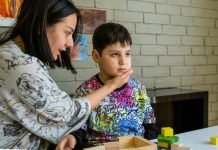
In a new study, researchers found that cognition is influenced by siblings.
Autistic children with autistic siblings have better cognition than those who are the only family member with the condition. Importantly, the outcome does not depend on birth order.
The research was conducted by a team at La Trobe University.
Autism Spectrum Disorder affects as much as 2% of the population but has several variants. It can occur in only one child among siblings, or in all, or most, of them.
Understanding why this arises has long been a key research target for scientists.
Although previous studies have found that having autistic siblings leads to better cognition for individual children with the condition, it was assumed that the order in which the children were born was a big factor.
To date, it has been thought that second-born autistic children would have better cognition because the parents already have experience and adapt their approach accordingly.
In the study, the team, however, found that even first-born autistic children with younger autistic siblings do better than those without affected relatives.
The study adds to the growing consensus that there are distinct subtypes of autism.
The team says examining differences between these families is crucial because most of the knowledge regarding the development of autism in the first years of life is based on families with multiple autistic children.
These families only comprise only one-fifth of the autism population, calling into question the validity of this knowledge for the majority of autistic individuals.
The lead author of the study is Dr. Lauren Lawson from La Trobe University’s Olga Tennison Autism Research Centre.
The study is published in the Journal of Autism and Developmental Disorders.
Copyright © 2019 Knowridge Science Report. All rights reserved.



